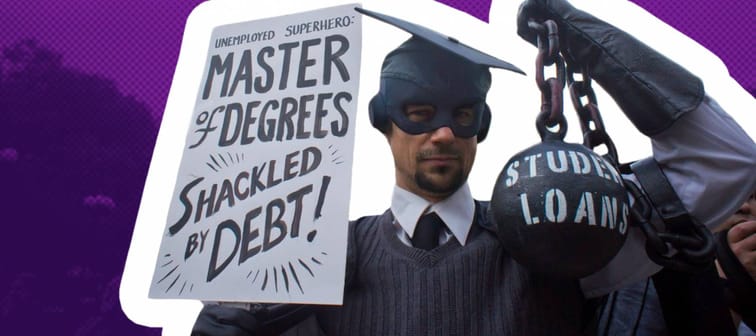Some shouldn’t bother making payments now
The pause on student loan payments and interest has been extended multiple times since it was first established under the Trump administration in March 2020. For cash-strapped grads, it's been a godsend.
Mark Kantrowitz, student loans expert and author and publisher of PrivateStudentLoans.guru, says his analysis of U.S. Department of Education data shows that, in reality, only 1.2% of borrowers have been making payments during forbearance.
However, he admits it’s unclear whether that figure represents borrowers regularly keeping up with their monthly payments, or borrowers who have made at least one payment during the freeze.
Borrowers who have been making payments during the freeze are taking advantage of the 0% interest rate to chip away at their debt and potentially reduce the interest they’ll owe later. But that strategy has its drawbacks.
“I don't recommend doing that in a couple of circumstances,” says Kantrowitz. “If you're working toward loan forgiveness, you don't want to make payments that aren't required because that reduces the amount of forgiveness you will ultimately receive.”
He adds that borrowers should also prioritize forms of higher interest debt at this time (like credit cards), bulk up their emergency fund and maximize their 401(k) contributions.
Lauryn Williams, founder of financial planning firm Worth Winning in Dallas, Texas, says that if you’re on an income-driven repayment plan and you owe more money than you make, paying down your student loans during the freeze is the equivalent of “flushing money down the toilet.”
The federal government offers four income-driven repayment plans, which can see your remaining debt forgiven after making qualifying payments for 10 to 25 years.
Kiss Your Credit Card Debt Goodbye
Having a single loan to pay off makes it easier to manage your payments, and you can often get a better interest rate than what you might be paying on credit cards and car loans.
Fiona is an online marketplace offering personalized loan options based on your unique financial situation.
When you consolidate your debt with a personal loan, you can roll your payments into one monthly installment. Find a lower interest rate and pay down your debt faster today.
Get StartedUsing the pause to sort your priorities
Williams believes most borrowers may have been focusing on other important goals, such as saving for a down payment on a home or increasing their overall financial stability.
Student success educator Lamesha Brown, based in St. Cloud, Minnesota, says she and her husband were able to purchase a home for her sister-in-law in Alabama. They’ve since converted the house into a residence for Section 8 voucher users, opened a Roth IRA account and were able to purchase a condo.
Brown graduated with a PhD in college student affairs administration from the University of Georgia in 2019 and has almost $32,000 in student debt from her master’s and doctoral degrees.
She says she grew up with little financial literacy. As a result, it was important for her to concentrate on other financial goals, especially as a woman of color from a low-income, single-parent household.
“I prioritize these goals, because I have to, and it matters for my family. It matters for those who come after me.”
Brown added that while she can afford to make student loan payments at this time, she chooses not to.
“As I've navigated my adulthood, I've worked to increase my financial literacy to determine ways that I can create some generational wealth.”
The end of the pause could be painful
As Kantrowitz and Williams both expected, the Biden administration extended the freeze again when it announced its student loan forgiveness plan.
The payment pause has been extended for one final time until Dec. 31. But even with this extension, some borrowers may still be unprepared to resume repayments.
“I think that there's going to be real trauma related to … the loan, about the way they've been treated,” Williams says.
With just $10,000 of forgiveness (and $20,000 for Pell Grant recipients) on the table, the relief may not quite cut it for some — especially those who recently found out they’re ineligible for forgiveness entirely.
The Federal Reserve acknowledged in May that some borrowers may be unprepared for payments to resume, citing rising delinquency and interest rates in the second half of 2021.
And the New York Fed more recently reported that total household debt for Americans soared over the second quarter of 2022, with credit card balances seeing their biggest jump in over 20 years.
Meet Your Retirement Goals Effortlessly
The road to retirement may seem long, but with WiserAdvisor, you can find a trusted partner to guide you every step of the way
WiserAdvisor matches you with vetted financial advisors that offer personalized advice to help you to make the right choices, invest wisely, and secure the retirement you've always dreamed of. Start planning early, and get your retirement mapped out today.
Get StartedA lack of education on student loans
Williams says many young borrowers may not have grasped how student loans would affect them over the long term.
“Imagine being 17 years old … you're just signing on the dotted line, because you've finished high school. And the next step, as America tells us, is to go to college.”
She adds that there's also a lack of education around how different types of financial aid work.
“I would say the biggest thing is not to ignore your student loans, to get a plan in place,” advises Williams, explaining that students need to look into the various income-based repayment plans.
Coleman explains that many students may not understand what compounding interest is or even that higher education isn’t necessarily the best route for everyone.
“When I [was in college], the information that they gave you was this huge packet of information, and they’d say, ‘Here read this.’ And that's essentially a contract.”
However, the student loan pause gave Coleman the opportunity to invest in cryptocurrency, get more technical education and start building a mindfulness program for neurodivergent people of color.
Coleman also testified in front of the Department of Education earlier this year about her negative experience with the University of Phoenix, which made her deeply regret her decision to attend.
“I think that the pause really allowed me to be able to kind of step back and see the full picture, and if there was a collective way to be able to handle this situation,” she adds. “We can start to move the needle on the way that some of these programs and institutions are being governed and handled.”
Sponsored
This Company Will Help Nearly Anyone Get Rid of Credit Card Debt
Do you feel like paying off your credit card is a constant grind, with no end in sight? You’re not alone. A personal loan offers lower interest rates and fixed payments, making it a smart choice to consolidate high-interest credit card debt. It helps save money, simplifies payments, and accelerates debt payoff.
Fiona is a free online service that shows you the best lending options to pay off your credit card debt fast — and save a ton in interest.








